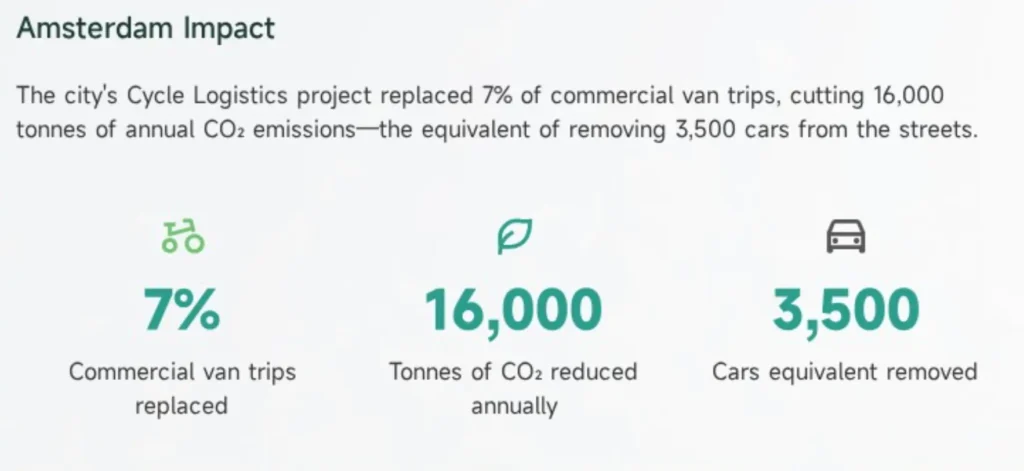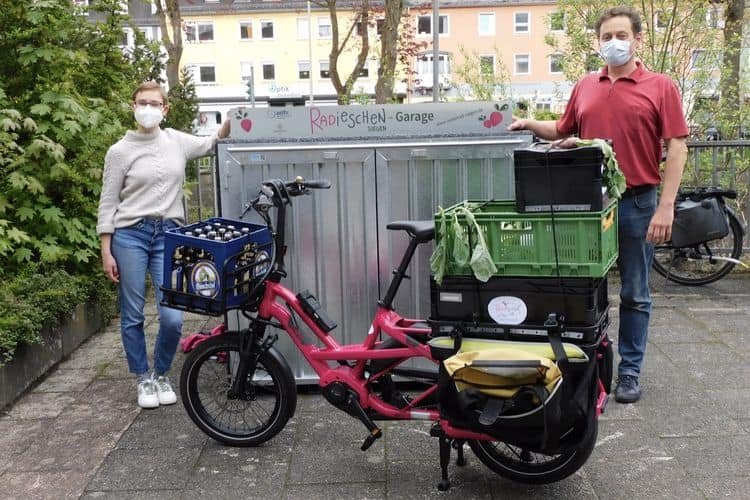Les villes européennes connaissent une profonde transformation de leur approche du transport urbain et de la logistique. Autrefois considérés comme une solution de niche, les vélos-cargos - en particulier les vélos-cargos électriques (e-cargo bikes) - ont rapidement évolué pour devenir un pilier stratégique de la mobilité durable, rentable et centrée sur les personnes. Ils ne sont pas simplement une alternative aux camionnettes ou camions de livraison traditionnels ; ils sont plutôt un catalyseur pour des environnements urbains plus sains, plus sûrs et plus résilients.
Dans toute l'Europe, les vélos-cargos contribuent à la réalisation d'objectifs climatiques ambitieux, à la lutte contre la congestion urbaine et à la réduction des coûts sociétaux liés aux paysages urbains dominés par la voiture. Cette transition est soutenue par une forte croissance du marché, des politiques de soutien et des avancées technologiques qui rendent les vélos-cargos de plus en plus compétitifs.
Définition des vélos-cargos et de leurs multiples avantages
Les vélos cargo sont des vélos ou des tricycles conçus pour transporter des marchandises, des passagers ou des équipements au-delà de ce qu'un vélo classique peut supporter. Leurs variantes électriques (e-cargo bikes) intègrent une assistance au pédalage alimentée par une batterie, ce qui leur permet de transporter des charges plus lourdes et de parcourir de plus longues distances avec moins d'effort physique.
Autrefois limités aux petits pilotes de livraison urbaine ou à l'usage familial, les vélos-cargos jouent aujourd'hui un rôle central dans la logistique et la mobilité urbaines. Leur attrait réside dans une combinaison d'avantages environnementaux, économiques, opérationnels et sociaux qui s'étendent bien au-delà du secteur des transports.
Avantages pour l'environnement : Fret urbain à zéro émission
Les vélos-cargos répondent directement au besoin urgent de décarbonisation des transports urbains. Contrairement aux camionnettes diesel conventionnelles, les vélos de transport fonctionnent sans émissions de gaz d'échappement, ce qui réduit considérablement l'empreinte carbone.
- Une étude londonienne a montré que les vélos-cargos produisent 96% moins d'émissions de CO₂ par kilomètre que les fourgonnettes électriques et jusqu'à 90% moins que les camionnettes diesel.
- À Amsterdam, la ville de Logistique du cycle projet remplacé 7% de trajets en camionnettes commerciales, découpage 16 000 tonnes d'émissions annuelles de CO₂.-l'équivalent d'une suppression 3 500 voitures de la rue.
Ces avantages environnementaux ont des effets en cascade. Un air plus pur contribue à améliorer les résultats en matière de santé publique, tandis qu'une réduction de la pollution sonore améliore l'habitabilité urbaine.
Efficacité économique et opérationnelle : Redéfinir les livraisons urbaines
D'un point de vue commercial, les vélos-cargos présentent des avantages économiques indéniables. De nombreuses études et projets pilotes ont démontré que les vélos-cargos sont plus performants que les camionnettes dans les environnements urbains denses.
- Les vélos-cargos peuvent réduire les coûts de livraison jusqu'à 90% en tenant compte du carburant, du stationnement et de l'entretien.
- À Milan, un programme pilote a montré une 23% réduction des délais de livraison et un 40% diminution des coûts opérationnels pour la logistique du dernier kilomètre par rapport aux camionnettes.
- Dans les centres urbains encombrés, les vélos-cargos livrent des colis 30% plus rapide et peut compléter 20-25 livraisons par heurecontre seulement 12 livraisons par heure pour les camionnettes.
La capacité des vélos-cargos à maintenir des temps de service prévisibles, même dans les zones à forte densité de circulation, permet aux entreprises d'optimiser les horaires de livraison et d'améliorer la satisfaction des clients.
Réduction de la congestion et amélioration de l'accès aux villes
Les vélos-cargos sont particulièrement adaptés pour circuler dans les rues encombrées des villes, les zones piétonnes et les zones à faibles émissions (LEZ), où les véhicules de plus grande taille font l'objet de pénalités ou de restrictions.
Leur taille compacte leur permet de contourner les files d'attente et d'accéder aux trottoirs sans bloquer les routes ou les pistes cyclables. En remplaçant les camionnettes, les vélos-cargos libèrent un espace urbain précieux, réduisent les incidents liés au stationnement en double file et atténuent les embouteillages, un avantage auquel les villes et les entreprises attachent une grande importance.
Avantages sociaux et sanitaires : Des villes plus sûres et plus actives
Au-delà des gains environnementaux et économiques, les vélos-cargos génèrent d'importants avantages sociaux :
- Promouvoir les déplacements actifs : L'augmentation de la pratique du vélo favorise des modes de vie plus sains et crée une culture du vélo dans les villes.
- Des rues plus sûres : Les vélos-cargos circulent à une vitesse inférieure à celle des véhicules motorisés, ce qui réduit le risque et la gravité des collisions.
- Santé publique : Un air plus pur et une pollution sonore moindre contribuent à améliorer le bien-être de la communauté.
Londres Vision zéro La stratégie de sécurité de l'UE, par exemple, s'aligne étroitement sur l'adoption des vélos-cargos, car ces véhicules réduisent les risques de circulation pour les piétons et les autres cyclistes.
Un cycle d'avantages qui se renforce lui-même
Ces avantages à multiples facettes fonctionnent en synergie. Les entreprises réinvestissent les économies réalisées grâce aux livraisons à vélo-cargo dans l'expansion de leurs flottes vertes, ce qui réduit encore les embouteillages et les émissions. Des rues plus propres et plus sûres encouragent un plus grand nombre de personnes à faire du vélo, ce qui stimule la demande d'infrastructures cyclables et normalise l'utilisation des vélos-cargos.
Les politiques urbaines visant à promouvoir les vélos-cargos devraient donc prendre en compte les besoins de la population. approche holistiqueL'objectif est de tirer parti des avantages environnementaux, économiques et sociaux de manière simultanée afin de maximiser l'impact.
Aperçu du marché européen des vélos E-Cargo : Situation actuelle et projections de croissance (2024-2034)
Le marché européen des vélos utilitaires électriques est entré dans une période de croissance explosive, reflétant son importance croissante dans les stratégies de mobilité urbaine.
- Valeur du marché en 2024 : USD 2,01 milliards d'euros
- Valeur marchande prévue en 2034 : USD 37,24 milliards d'euros
- CAGR : 33.90% (2024-2034)
Une analyse distincte prévoit que le marché passera de 1,16 milliard d'USD en 2025 à 1,6 milliard d'USD en 2029, ce qui représente un taux plus conservateur mais néanmoins significatif. 8.51% CAGR.
Cette trajectoire ascendante est alimentée par plusieurs forces convergentes :
- Priorités en matière de mobilité durable : Les villes et les entreprises accordent la priorité aux transports à faible émission de carbone.
- Pression réglementaire : Des normes environnementales plus strictes, telles que le Green Deal européen, accélèrent l'électrification des flottes.
- Une logistique rentable : La demande de solutions abordables pour la livraison du dernier kilomètre n'a jamais été aussi forte.
Leaders régionaux : L'Europe occidentale à l'avant-garde
L'Europe occidentale domine le marché des vélos utilitaires électriques, l'Allemagne, les Pays-Bas, le Danemark et la France étant en tête de l'adoption.
- Allemagne : Tenue 44% du marché européen (2024)Grâce à de fortes traditions cyclistes, à des politiques climatiques ambitieuses et à des investissements dans des infrastructures cyclables telles que des voies protégées et des parkings sécurisés.
- Pays-Bas et Danemark : Ces pays cyclistes bénéficient de décennies de développement des infrastructures, ce qui en fait des environnements idéaux pour l'utilisation généralisée des vélos à cargaison électronique.
- France : Paris et d'autres villes françaises développent rapidement des initiatives de vélos-cargos dans le cadre de stratégies plus larges de mobilité et de lutte contre le changement climatique.
Paysage de l'industrie : La diversité des acteurs au service de l'innovation
Le marché est constitué d'un mélange dynamique de fabricants de vélos établis, de startups spécialisées dans la mobilité électrique et de producteurs spécialisés dans les vélos-cargos. Les principales entreprises sont les suivantes :
- Flèche urbaine
- Riese & Müller
- Bicyclettes Tern
- Bouchers et vélos
- Vélos Rad Power
- Babboe
Ces marques investissent massivement dans diversification des produitsqui propose des modèles tels que
- Vélos cargo à longue queue: Porte-bagages arrière allongés pour le transport de plusieurs enfants ou d'objets encombrants.
- Conception des chargeurs frontaux (Bakfiets): De grandes boîtes à l'avant pour les marchandises plus lourdes ou plus délicates.
- Trikes à trois roues : Capacité de charge et stabilité accrues, idéales pour le fret commercial.
Progrès en matière de la technologie des batteries, les moteurs électriques et les cadres légers rendent les vélos-cargos plus durables, plus fiables et plus polyvalents que jamais.
Suggestion d'image : Un collage étiqueté montrant différents modèles de vélos e-cargo (à queue longue, à chargement frontal et tricycle) des principales marques européennes.
Évolution du marché et spécialisation
Le secteur des vélos-cargos est en train de devenir un segment autonome, distinct de l'industrie du vélo au sens large. Cette évolution est illustrée par le lancement de la marque MobifutureLe salon de l'électricité et de la mobilité urbaine se tiendra au même endroit que le salon de l'environnement. Eurobike à partir de 2026.
Ce nouvel événement mettra en lumière les vélos-cargos en tant qu'élément clé de l'avenir de la mobilité en Europe, en mettant en relation les fabricants, les décideurs politiques et les exploitants de flottes. À mesure que les investissements privés augmentent et que les économies d'échelle s'installent, le secteur devrait devenir de plus en plus autonome, ce qui réduira la dépendance à l'égard des subventions publiques.
Suggestion d'image : Photo d'un hall d'exposition Eurobike en pleine effervescence, présentant des modèles de vélos cargo innovants et permettant aux professionnels du secteur de nouer des contacts.
Conclusion : Les vélos-cargos, pierre angulaire de la mobilité urbaine européenne
Les vélos-cargos ont des effets transformateurs pour les villes, les entreprises et les communautés. Ils réduisent considérablement les émissions de gaz à effet de serre, diminuent les coûts logistiques et améliorent la qualité de vie dans les villes grâce à des rues plus sûres et à des espaces publics améliorés.
Le marché européen des vélos utilitaires électriques est sur une trajectoire ascendante, avec une croissance de 2,01 milliards d'USD en 2024 à 37,24 milliards d'USD en 2034. Cette expansion est le fruit de politiques avant-gardistes, d'innovations technologiques et d'un changement d'attitude du public à l'égard du transport durable.
Pour les décideurs politiques, investir dans des infrastructures et des mesures incitatives en faveur des vélos-cargos n'est pas seulement un geste écologique, c'est une décision stratégique en matière de mobilité urbaine, avec des dividendes sociaux et économiques à long terme. Pour les entreprises, l'adoption des vélos-cargos constitue un avantage concurrentiel évident pour répondre aux attentes des clients en matière de livraisons rapides, fiables et respectueuses de l'environnement.
Alors que les villes continuent de lutter contre les embouteillages, le changement climatique et les problèmes de santé publique, les vélos-cargos apparaissent comme une solution éprouvée et évolutive, capable de remodeler la mobilité urbaine européenne pour les décennies à venir.







